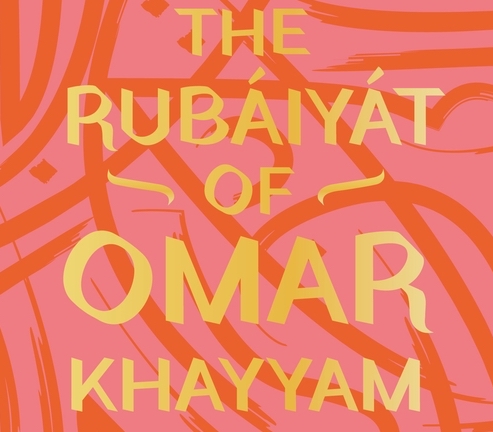Edward FitzGerald, who published the first edition of his translation of the Rubáiyát of Omar Khayyám in 1859, arranged the poems to unfold over a day in the life of the protagonist, beginning with a rowdy morning, as explained earlier. The second quatrain in his first edition is this:
II.
Dreaming when Dawn’s Left Hand was in the Sky
I heard a Voice within the Tavern cry,
“Awake, my Little ones, and fill the Cup
“Before Life’s Liquor in its Cup be dry.”
The original, which was also in FitzGerald’s Calcutta manuscript, was published by E. H. Whinfield in his Persian-English edition of the Rubáiyát of Omar Khayyám, as poem number 1:
آمد سحری ندا ز میخانهٔ ما
کای رند خراباتی دیوانهٔ ما
برخیز که پر کنیم پیمانه ز می
زان پیش که پر کنند پیمانهٔ ما
FitzGerald’s version is gentler and more genteel than the original, perhaps recalling the camaraderie of young Cambridge undergraduate men such as William Makepeace Thackeray.
This poem is not in the 1460 Bodleian manuscript on which I based my own translation, so it isn’t in my book. I have played around with this one, doing it as free verse and as a more formal Persian quatrain (rubá`í)
Here’s the latter:
A dawn cry woke us when the night was black:
“You crazy rascal in this run-down shack,
get up and finish off those dregs of wine —
before our time is up and we’re called back.”
(transliteration:)
Āmad saharī nedā ze meyḵānah-‘e mā
K’āy rand-e ḵarābātī-ye dīvānah-‘e mā
Barkhīz ke por konīm peymānah ze mey
Zān pīsh ke por konand peymānah-‘e mā
I even had Sora AI do it as an Instagram reel, giving it a modern setting, perhaps in Tehrangeles:
FitzGerald had the scene right — drinking buddies frequenting a tavern have drunk themselves to sleep. Now it is dawn of the next day, and there is still wine in their cups, and they fear it will go to waste — just as there is a danger of their lives coming to an end before they have experienced life fully.
The tavern is at first called a maykhaneh a wine-house, but then kharabat, literally ruins. Drinking establishments were illicit in Muslim societies, though some rulers gave them wide latitude while others cracked down on them. But because they were in ill repute with respectable Muslim society, they tended to be owned by Christians or Parsis (Zoroastrians), and to be located in the disreputable part of town. Thus, they were in broken-down buildings or kharabat.
The unidentified voice addresses the dozing protagonist, calling him a rend or rapscallion or rascal and “crazy” or “wild” divaneh.
——————

—-
Order Juan Cole’s contemporary poetic translation of the Rubáiyát from
or Barnes and Noble.
or for $16 at Amazon Kindle
——-
The late Franklin Lewis told us that the stock figure of the rend in Persian poetry, “variously translated in English as “rake, ruffian, pious rogue, brigand, libertine, lout, debauchee,” is the very antithesis of establishment propriety.”
He went on, speaking specifically of the poetry of Hafez of Shiraz (d. 1390),
- “we find figures of counter-culture and disrepute, including beggars (gadā, faqir, mofles), qalandars [wandering Sufi dervishes], and the characters who haunt the “ruins” (ḵarābāt). These ruins are scenes of illicit pleasure, occupied by drinkers and drunkards, the wine seller and wine server (sāqi), the Magian [Parsi or Zoroastrian] elder (pir-e moḡān) and Magian ephebe (moḡ-bačča), and the beloved (šāhed,delbar, maʿšuq, etc.). Chief among the anti-establishment figures is the rend, an irreligious alter-ego to Hafez’s more reputable persona, a safety valve saving him from the sanctimonious self-righteousness that characterizes the religious authorities”
Lewis noted that Hafez sometimes adopts the pose of the respectable urbane Muslim, or apparently veers into Muslims spirituality of a Sufi sort, but at others celebrates the rend.
I have sometimes thought that the rend in this sense is what happens to respectable American Christians at a Las Vegas stag party.
The quatrains attributed to Omar Khayyám inhabit that same universe, of ambiguity, though they on the whole are far more openly disreputable than anything in Hafez, and are expressed in cruder and less lofty terms.
One purpose of the rend was to bash hypocrisy. The spiritual school of the Malamatiya [“self-blame”] taught disciples to fear pride in good works, and so openly drinking wine, for instance, could humble them and convince the public that they were abject. Since no one attains to true piety and spirituality, they felt, it was better to suffer insults than to have people imagine them to be holy.
FitzGerald’s teasing “little ones,” recalling the affectionate forms of address in the homosocial spaces of Victorian male British literary gatherings, does not convey the disreputable overtones of the original rend. And while Thackeray in Paris may have acted crazily when FitzGerald accompanied him there in their youth, the “craziness” envisaged in this quatrain was of a different order entirely.
In this series:
FitzGerald’s Rubáiyát of Omar Khayyám 1:1
“Awake my little ones and fill the Cup!” FitzGerald’s Rubáiyát of Omar Khayyám 1:2
“Those who Stood before the Tavern” – FitzGerald’s Rubáiyát of Omar Khayyám 1:3
Now the New Year is Reviving old Desires: FitzGerald’s Rubáiyát of Omar Khayyám 1:4
“But still the Vine her ancient Ruby Yields:” Fitzgerald’s Rubáiyát of Omar Khayyám 1:5
“Red Wine!” – the Nightingale cries to the Rose: FitzGerald’s Rubáiyát of Omar Khayyám 1:6



 © 2026 All Rights Reserved
© 2026 All Rights Reserved